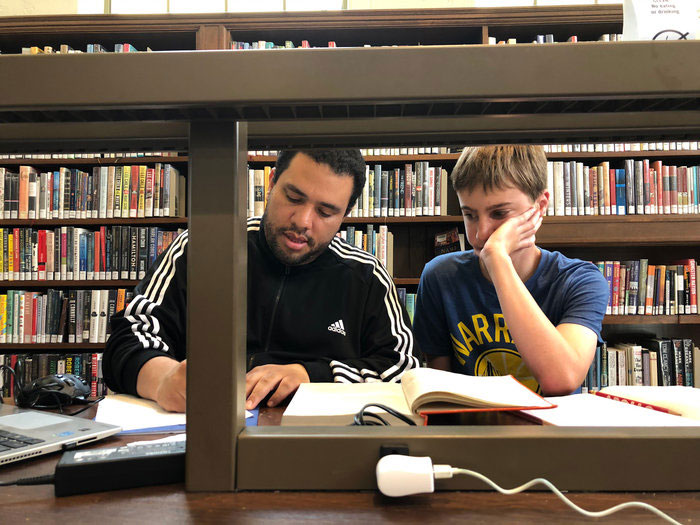
The student-parent relationship doesn’t work for tutoring math. We’ve had hundreds of calls from frustrated parents trying to tutor their kids in math. The results range from frustration to crying and shouting. Do you think that sounds like a productive learning environment?
Why can’t I tutor my own child in math?
There are a lot of reasons why parents should not tutor math.
- Your child is trying to impress you and live up to your expectations. They want you to think they are smart. Your student will feel like you are judging them while trying to figure out the problem. This creates math anxiety. You can't learn anything while stressed out.
- You know each other better than anyone. This is great for parenting but bad for tutoring mathematics. Every dynamic of your relationship will come out. Your child needs to rebel. Your need to impose a work ethic. The result is stress which turns off the brain.
- You may be great at math. Maybe you are an engineer or physicist. There is no correlation between being good at math and being good at tutoring math. Many parents don’t understand the order math topics should be presented. You are probably making the situation worse.
Many parents are easily frustrated when trying to tutor math. If your child senses your frustration they will become uneasy and shut down. Once your child shuts down no learning will occur.
Early in my career, a parent with a Ph.D. in physics hired us to tutor his son in physics. At the time I couldn’t understand it. I asked, “why don’t you do it yourself?” He responded in frustration “I tried it doesn’t work!” The dynamic of the parent/student relationship doesn't work for mathematics and physics tutoring.
What is it about the student-tutor relationship that does work?
Now you have insight into why tutoring your child in math has gone terribly wrong. Let’s take a look at why a professional math tutor can bypass these pitfalls.
The most important thing to understand is the student must be in a safe state of mind to learn anything.
Once the defense mechanism is activated, there is no chance of learning anything. Period.
Imagine approaching a stranger on the street and shouting at them “what’s your address!!!!” The stranger would have trouble recalling something as basic as their home address. The reason for this is the fight or flight response has been activated. The brain is focused on survival, not memory recall.
Sadly this is the environment in which many students learn math.
When a student is trying to learn math under stress they are in fight or flight mode. When a math teacher calls a student in front of the class, the priority is to avoid appearing dumb to their friends.
The brain will not work for learning, just surviving. The same thing happens when a parent becomes frustrated tutoring their child. The child's main priority is not to appear dumb to mom and dad. They want to impress you. Imagine how difficult it would be to figure out something complicated under these conditions. Take the time to get inside your child's mind and understand their experience.

How do math tutors put their students at ease?
This leads us to the beauty of the student-tutor relationship. The most important thing is making your student feel at ease. Many students are afraid of feeling dumb in front of you. It’s the math tutor's job to create a safe space.
- The beginning of each tutoring session is dedicated to building rapport. We want to get to know them as a person. We want to know what they are passionate about in life. It's important to know what classes the student enjoys. It’s SO important to create a personal connection. This is the first step in creating a real relationship.
- We then show how mathematics relates to the student's passion. We are not trying to convince you to become a mathematician. We ARE trying to convince you that a knowledge of mathematics will make you better at your passion. If you’re a musician, we can talk about frequency and the harmonic series. If you’re an artist, we can talk about the golden ratio and how it was used in renaissance art. If you’re an athlete, we can talk about statistics and sports betting.
- We react calmly to the student's mistakes and let them know it’s not a big deal. Everyone makes mistakes, especially in math. It’s SO important that your student feel comfortable making mistakes. They should never feel judged.
I like to ask my students if they think my physics professors made mistakes. They usually answer yes, which is correct. The difference between the professors and us is they catch every mistake. How? The professor has built a system for checking their work. Every math line goes through a checklist to catch mistakes. One trick is to make sure the units match on both sides of the equation. If an algebraic error occurred the units won't match.
The fact that Ph.D. mathematicians frequently make mistakes puts the student at ease. Most students think they just shouldn't make mistakes, which is false. We will help your student create their own mistake checklist. Given tools to verify their work, they develop the confidence to push forward.
We never get frustrated with the student. If a student is working on a math problem and you become frustrated, the student can feel that frustration. It will make them feel dumb, and they will shut down. No more learning will occur on that day.
Praise is a powerful motivator. If a student does something right we give lots of praise. This will build confidence and continue to put the student at ease. Once the student has that “ah-ha” moment we give them lots of praise. This changes their math story for the better.
There is a lot more that goes into tutoring math than just doing math. It’s a process that engages the student's deepest fears and insecurities. This is why most parent attempts to tutor their kids goes horribly wrong. There are too many expectations and frustrations tied up in your relationship. This will get in the way of great mathematics tutoring. By engaging a math tutor you get a clean slate. You can develop a new kind of relationship, free of past experiences and expectations.




